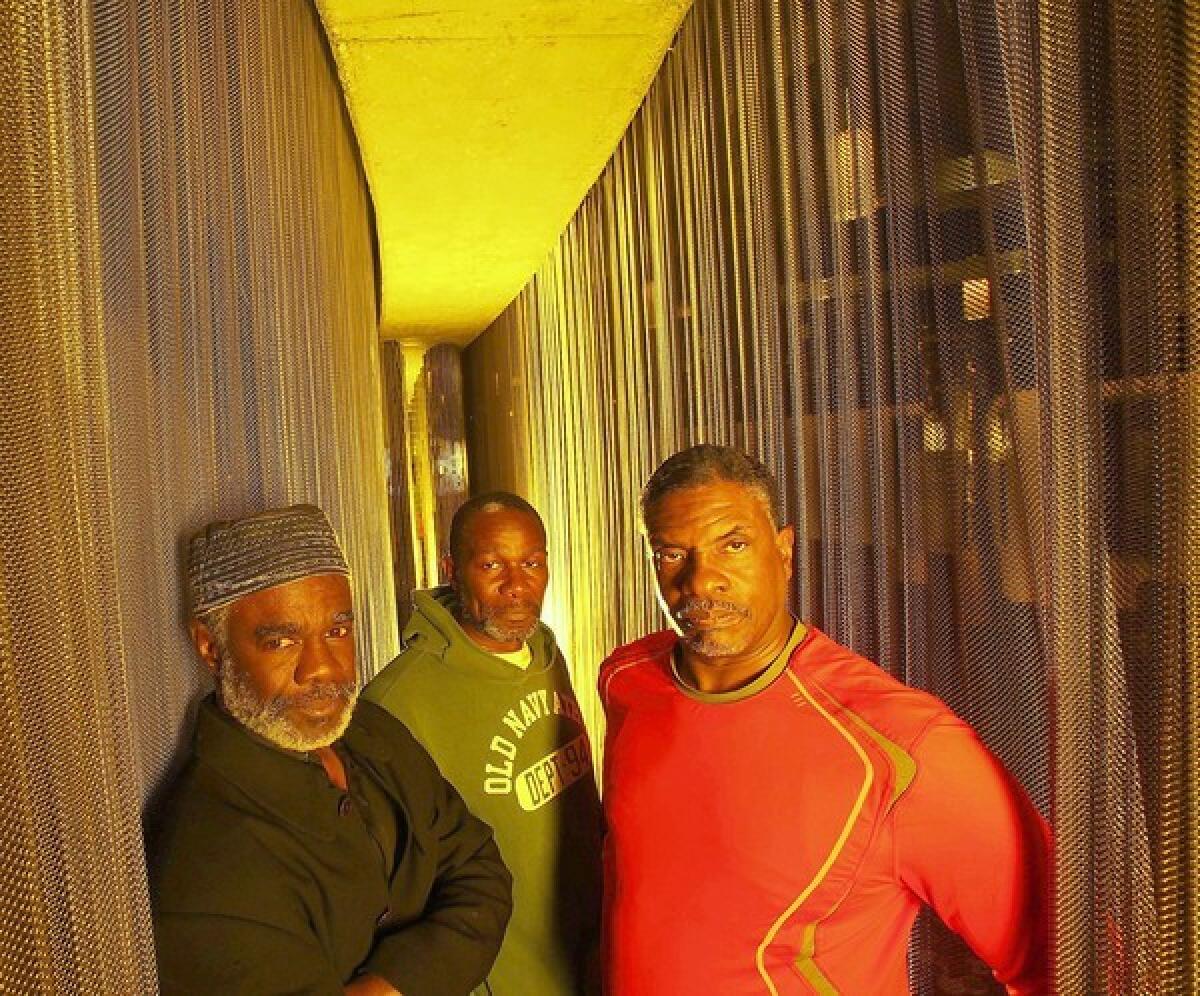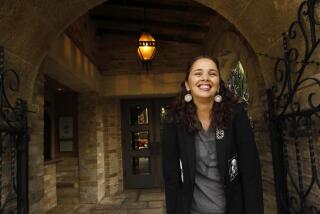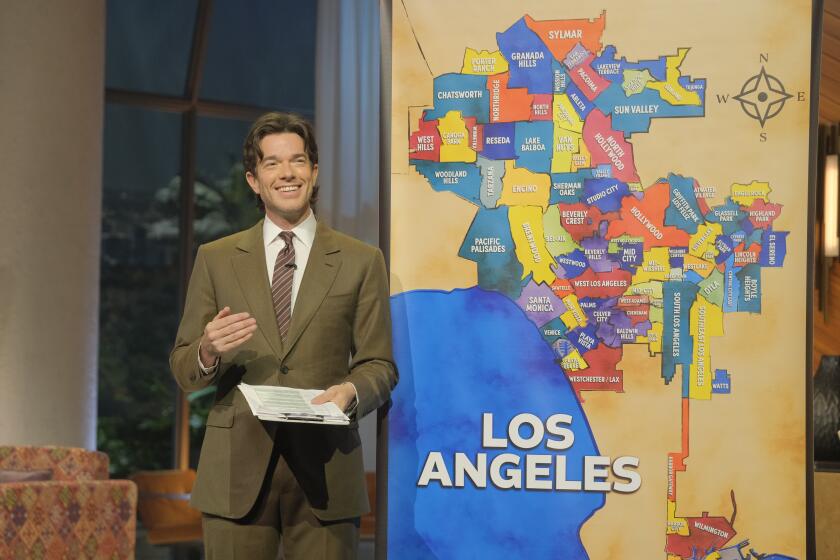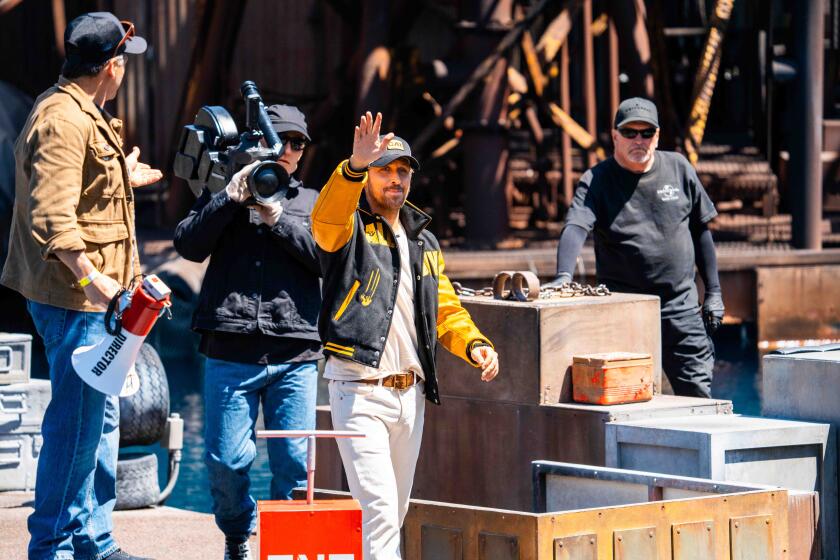‘Joe Turner’s’ actors share August Wilson’s gift of gab

Among the pleasures of seeing an August Wilson play, it’s often said, is just listening to the people talk.
As Los Angeles Times theater critic Charles McNulty has noted, Wilson stocks his scripts with “natural raconteurs” and lets them soar in “verbal arias” full of earthy poetry.
In that sense, a recent dinner break interview with Keith David, John Douglas Thompson and Glynn Turman was more or less an extension of what they’d been doing in rehearsals for the Mark Taper Forum’s revival of “Joe Turner’s Come and Gone.”
The drama, which premiered in 1986 and arrived on Broadway two years later, was the fourth installment in the 10-play Wilson cycle that explores the African American experience in each decade of the 20th century.
All but one, “Ma Rainey’s Black Bottom,” is set in the Hill District of Pittsburgh, where he grew up. The 10th, “Radio Golf,” was playing at the Taper in 2005 as Wilson made final revisions before dying of liver cancer at age 60 two weeks after it closed.
PHOTOS: Arts and culture by The Times
Over takeout pizza and sandwiches, the raconteurial spirit carried over into the “Joe Turner” costars’ own stories. Even though this is only the second Wilson play for David and Turman and Thompson’s first, the playwright’s gravitational pull, or that of his crucial ally, director Lloyd Richards, has been strong for all of them.
David plays Seth Holly, a cranky boardinghouse owner and avid backyard entrepreneur who has no patience for Thompson’s character, Herald Loomis, a devastated victim of brutal racist exploitation in early-1900s Tennessee.
Loomis turns up at Holly’s boardinghouse in 1911, having spent seven years enslaved by Joe Turner — an unseen historical figure who, as the governor’s brother, enjoyed impunity while dragooning presumably free blacks into forced labor. Turman plays Holly’s longtime boarder and polar opposite, Bynum, a spiritual healer who performs folk-magic rites and tries to help Loomis.
A radiant, hard-earned theme of “Joe Turner’s Come and Gone” is that a sustaining force is alive in the world for each of us, and it’s possible to bind oneself to it — to find one’s “song,” as Wilson puts it — instead of staying chained to suffering. Without deliberately trying to, the middle-aged costars told stories about themselves that illustrated a slice of what Wilson says about the importance of finding, or not forgetting, your song.
David and Turman are L.A.-based Emmy Award winners. As a television narrator, David’s elegant basso profundo has stitched the fabric of several Ken Burns documentaries, including “Jazz,” and, in his Emmy-winning performances, “The War” and “Unforgiven Blackness: The Rise and Fall of Jack Johnson.”
The bearded Turman had a recurring part in “The Wire” as Baltimore’s mayor. He won his Emmy in 2008 for a guest-starring role in another HBO series, “In Treatment.”
CHEAT SHEET: Spring Arts Preview
Thompson, who lives in Brooklyn, collected a 2009 Obie Award playing Othello; around that time he was the subject of a New Yorker profile in which Columbia University Shakespeare scholar James Shapiro described him as “the best American actor in Shakespeare, hands down.”
A crucial moment for Wilson came when he dropped out of high school over a teacher’s allegation that he couldn’t have submitted a brilliant essay unless it was plagiarized. Around the same time, Turman was helping to write an important chapter in the history of American theater and African American life.
One day in 1958, not long after they’d moved from Harlem to New York’s Greenwich Village, Turman’s mother told him that her friend who lived down the street, “the pretty lady with the Collie dog,” had written a play that needed a 12-year-old boy such as himself.
ART: Can you guess the high price?
Reluctantly tearing himself away from baseball, Turman accepted Lorraine Hansberry’s invitation and stepped into the role of Travis Younger. The play was “A Raisin in the Sun,” and his stage parents were Sidney Poitier and Ruby Dee; Turman says he doesn’t know whether his stage grandma, Lena Younger, played by Claudia McNeil, was named after his mom, Lena McCaulla.
Turman spent a year with the show, first on the road, then on Broadway, and continued acting in other plays. But his mother died while he was in his teens, and he thinks he might have drifted away from acting if a shop teacher who’d seen him in “Raisin” hadn’t urged him to apply to the now-legendary High School of Performing Arts.
As he neared age 20, Turman found himself with no acting roles and driving a rickety moving van through mid-1960s Manhattan. Idling at a stoplight, he sneaked a peek at the casting notices in a stage newspaper. At that moment, he saw, his old “Raisin” director, Lloyd Richards, was holding auditions for a new play by Ron Milner.
PHOTOS: Hollywood stars on stage
Turman sped over to have a word with Richards — his fellow movers and their customer would just have to wait — and resurrected his foundering career. As artistic director of Yale Repertory Theatre, Richards would later usher August Wilson into the limelight, launching six plays in the cycle and taking them to Broadway. But by the time the Wilson-Richards collaboration began in the early 1980s, Turman had moved to Los Angeles. He says he doesn’t regret having missed out on Wilson roles until 2008, when he starred in “Two Trains Running” at L.A.’s Ebony Repertory Theatre.
“My aunt had a great saying: `What’s for you is what’s for you,’” Turman said in a rich, gravelly baritone. Maybe, he says, Wilson’s roles were not for him until he passed 60 and, like the character he’s now playing, had matured fully into his own life’s song.
David’s path to his first role in a Wilson play, 18 years ago, was strewn with discordant notes between himself and director Richards.
In the late 1970s, around the time he’d finished his acting degree at the Juilliard School, the New York City-raised David, like Turman an alum of the High School of Performing Arts, flew to Los Angeles to audition for a part in the miniseries “Roots: The Next Generation.” David says he was too nervous to seize the job; speaking in an airy whine, he mimicked the chiding reaction of the director, Richards: “`Why’d you get so uptight?’”
In 1983, with a bevy of Shakespearean and other classic stage roles under his belt, David says Richards signed him to star in a non-Wilson play at Yale Rep, with the understanding that he’d be bounced if James Earl Jones became available. Jones showed up, David was out of a job, and Richards made a pledge to the young actor: “He said, ‘I owe you one.’”
David said he was invited a few years later to audition for a touring company of Wilson’s “Fences” but thought he was too old or too young for the available parts (now in his 50s, he’d love to play Troy Maxson, the embittered former baseball star in “Fences” who was originated by Jones in a Tony-winning turn).
In 1995, Richards delivered on his promise. He gave David — by then something of a draw in his own right after a Tony-nominated role in George C. Wolfe’s “Jelly’s Last Jam” — the lead as a doomed 1940s bluesman in Wilson’s “Seven Guitars.”
For David, Wilson’s talking arias require the same level of skill, concentration and understanding as Shakespearean verse.
“The demands of the language are just as important,” he said. “It’s poetry. Wilson isn’t writing in iambic pentameter, but he’s writing in a rhythm. Phylicia [Rashad, who’s directing ‘Joe Turner’] was talking about it the other day: You can’t miss an ‘and’ or a ‘but.’ When you’re on the beat and with the beat, then it’s like music.”
It will be up to Thompson, in the drama’s final moments, to effect the sudden transformation of Herald Loomis. On the page, the degree of thespian difficulty seems off the charts.
But if anyone should know about undergoing profound transformation in a theater, it’s Thompson.
One night in spring 1986, he stood outside Yale Repertory Theatre holding two tickets to the premiere of a new play — a young computer salesman aiming to impress a student at Yale Medical School with his cultured ways on their first date. It would, in fact, be only the second play he’d ever seen, after Rupert Holmes’ musical version of Charles Dickens’ “The Mystery of Edwin Drood.”
She stood him up, and now he can’t recall her name — “I think it was Denise.” He remembers the play well. It was “Joe Turner’s Come and Gone,” and Thompson says it changed his life.
“It was nobility in action, something I’d never seen.” The writing and the actors, including Charles S. Dutton as Loomis, “dignified these normal lives and gave them greatness. As I was watching, I was praying this would be something I could do and devote my life to.”
Thompson said he deferred his new dream for several years, but when he was laid off, he had enough savings and severance pay to live on while pursuing it with classes at Trinity Repertory Company in Providence, R.I.
And now, here he is. “I said to Keith the other night as I was walking home, ‘I’d always romanticized this play and the role because it’s what made me want to be an actor,’” Thompson said. “‘When you romanticize things, you forget how hard they are.’ I hope all the stuff I’ve done previously has prepared me for this. It’s mountain climbing.”
‘Joe Turner’s Come and Gone’
Where: Mark Taper Forum, 135 N. Grand Ave., Los Angeles.
When: 8 p.m. Tuesdays through Fridays, 2:30 and 8 p.m. Saturdays, and 1 and 6:30 p.m. Sundays. Ends June 9.
Tickets: $20 to $70
Contact: (213) 628-2772, https://www.centertheatregroup.org
More to Read
The biggest entertainment stories
Get our big stories about Hollywood, film, television, music, arts, culture and more right in your inbox as soon as they publish.
You may occasionally receive promotional content from the Los Angeles Times.







